- Home
- Lauren Kate
The Orphan's Song Page 7
The Orphan's Song Read online
Page 7
The wind cut cold across the water and the sky was filmed with thin, fast clouds. She drew her cloak closer about her.
Christmas was coming. Carnevale would soon wind down for its December pause. During the two weeks of Advent, Venetians would flood the Incurables. It was a merry time of year at the hospital, but Violetta could not feel the season’s joy.
She intended to stay on the roof until she stopped expecting Mino’s arm to fall around her waist, stopped listening for his jokes about the passersby below. She was glad of the darkness, the calli blending together below. The night made it impossible to look for the route she had taken between Mino’s apartment and here. Now part of her wondered why she had returned, why she hadn’t headed for the horizon?
The roof throbbed with his absence. She fell to her knees and sobbed. She would come back tomorrow. She would try again to make it hers.
* * *
FEVER CAME TO the Incurables in early December. First Laura complained of sweats and heart palpitations. Then Olivia fell gravely ill. Soon most of the girls on Violetta’s floor were sick. She hoped the disease would infect her, too—that something else beside Mino’s absence would take hold and lay her low.
By the twelfth day of December, lessons reminded Violetta of a capon carcass picked clean. She heard only holes in the music—where Laura’s violin should have been during the first allegro, where the missing contralto singers made the sopranos sound indolent, as if the ten of them shared a single lung. They performed a pitiful imitation of Porpora’s oratorio. At least no one besides the prioress would have to hear them.
In the year since she had first sung with Mino on the roof, Violetta had tried to replicate that sound in her music lessons. But even as she worked with Giustina on her range and flexibility, even as she improved, she never could find the grace that came so easily with Mino. Since he’d left, it had only gotten worse. Her voice sounded as clumsy as when she was a child.
Reine, healthy as ever, had been given the aria that morning. It was Giustina’s part, but neither Reine nor Violetta could approach their mentor’s angelic tones. Violetta tried not to listen. Before she had hated the French girl for her wealth, snobbery, and family. Now Reine also embodied Violetta’s deepest regret. She couldn’t look at Reine without seeing Mino’s devastated face.
She had believed him and his love when he proposed—even if she couldn’t accept. Then she had seen the passion in his lips and hands on Reine. She had felt a fool. Though what she had done was worse. The priest may have absolved her, but she knew her lie was unforgivable.
Reine’s voice snagged on a note in an ascending melisma, and the prioress rapped her podium. “Again,” she commanded sharply.
Now that Violetta had started thinking of Mino, it was hard to stop. She was getting better at pushing him from her thoughts, but still he found ways in. Yesterday she’d breathed in the scent of lemon in the courtyard, and instantly she was standing atop the ponte Foscari, gazing with him at the Grand Canal, smelling the cologne of a woman to their left. She hadn’t even remembered that woman—nor anyone else on the bridge that day—until she smelled the lemon and was back there with Mino. If only they could have stayed in that moment, before they’d ever hurt each other.
* * *
AFTER LESSONS, the prioress approached Violetta and handed her a beaked white mask, the ones the doctors wore during plague. Its beak was filled with disinfecting essences, meant to block the vapors of the sick.
“Laura wants to see you.”
Violetta raced down to the infirmary, fearing the worst. She could count on one hand the number of times she had been inside the hospital’s infirmary. The syphilitics there were kept almost as separated from the music school girls as the boys were. Violetta stopped at the door to put on the mask, tying the ribbons over the back of her shorn hair. She could not help but think of Mino tying the ribbon of her mask on that doomed afternoon.
She pushed into the room, dizzied by the stench of the steaming holywood tea that made the patients sweat. In the back corner, at least a dozen fevered orphan girls lay sequestered. The atmosphere was doleful and uncomfortably hot, though most of the patients shivered.
An overwhelmed nurse in a beaked mask made harried rounds among the beds, the syphilitics, and the girls. Violetta felt for her. She was a figlia di commun, someone who used to be in the music school but had never progressed to the coro. She’d likely die here, catching the worst of one sickness or another. Another failed musician would take her place.
When Violetta spotted Laura, she rushed to her, relieved to find her propped on two pillows, alert. Her curly hair looked dirty and her skin was pale.
“You look wonderful,” Violetta said.
“I look like death. How were lessons?”
“Curse lessons,” Violetta said. “Do you want me to bring your violin?”
Laura licked chapped lips, swallowed. “Olivia died this morning.”
Violetta gasped. Olivia saved breakfast for Violetta when she was late. Both girls had been born the same winter. Violetta had known her all her life.
Laura whispered, “I’m next.”
Violetta took Laura’s shoulders. “You will not die. I need you.”
Laura’s eyes dampened. Violetta’s did, too. At last, a smile cracked Laura’s lips. “God knows that’s true.”
Both girls laughed. It was an anguished sound, and soon tears rolled down their cheeks.
Then Laura grew quiet, looking over Violetta’s shoulder. Violetta followed her gaze. They were carrying another girl in.
“Giustina,” Violetta whispered, standing up.
“Go,” Laura said.
Violetta rushed to her sottomaestra, who slipped in and out of consciousness as the nurses brought in another cot. Giustina’s skin was deep crimson. She writhed, gripped by a fever dream. Violetta felt the heat radiating from her body.
Kneeling beside Giustina, Violetta began to hum the aria from Porpora’s oratorio. Giustina didn’t open her eyes, but she stilled. Violetta stroked her hair, now singing the words, now a little louder, feeling her way through the song like a prayer. She closed her own eyes and imagined herself up on the roof, surrendering with a quiet intensity to the crescendo of high notes at the song’s end.
She opened her eyes to the sound of applause. It was a syphilitic patient a few beds down, a woman not much older than Violetta, with bright green eyes.
“I love a skillful crescendo,” she said, her own voice surprisingly smooth, so quiet Violetta had to lean closer. “I used to go to the opera twice a week.” She winced, closing her eyes for a moment to catch her breath before continuing. “Sometimes we hear your music through the walls. If what you just sang can’t heal your friend, I don’t know what can.” She made the sign of the cross.
Violetta was moved, imagining this frail woman in her previous life, filled with operas and excitement. How odd to have both lived beneath this roof and never seen each other before. “I’ll come back tomorrow.”
The woman smiled wryly. “I’ll be here.”
Violetta looked down at Giustina, who was sleeping peacefully. In the corner, Laura was, too.
“Love is here,” Violetta whispered to her sottomaestra.
As she stepped into the courtyard, someone touched her shoulder. She turned to see a tall man removing his own beaked mask. It was Porpora.
“You’re in the music school,” he said, his voice a rich baritone. “Giustina is your sottomaestra, is she not?”
“Yes, Maestro,” she said, her heart racing. He had never spoken to her directly. Had he heard her singing in there? The thought was mortifying. She hadn’t even been sitting up straight.
“She’s taught you well,” he said.
“She’s a good teacher. She trained Reine, too.” The words rushed out, and she hated that she’d brought up the French girl, but she didn’t
want Porpora to lose esteem for Giustina, thinking she wasted time on Violetta’s mediocre talent. At least Reine had an air of stardom.
“Come,” Porpora said. “Let us pray for Giustina’s recovery. Then you and I shall discuss a new aria.”
* * *
THE COPYIST BROUGHT in two sheets of paper so fresh the ink still shone. Violetta sat across from the maestro in his office, reading his recent music, her spine straight as a violin’s bow. She was afraid to break whatever spell had seated Porpora across from her. Any graceless word or movement might alert him to his mistake.
Porpora was efficient but he was not tidy. Papers and books of music overflowed out of his desk. An oboe sat in the corner next to a pair of red silk slippers. The air smelled like anise and dust. Violetta wondered what he went home to at night. Where did he take off his wig? Did he have a wife and children? What was he trying to say with his music?
He was speaking intimately of how she must perform his new aria at Sunday’s mass. Violetta? Singing the aria. With the coro. Before an audience of a thousand people. She worked to appear at ease.
“During Advent,” Porpora said, looking at his music, “everything anticipates the coming of the savior. It is a time of intensity and expectation, the perfect mood for the music I have written. But most of the people you will sing to Sunday are coming back to mass after six weeks of carnevale’s abandon. And now they will make no more masquerades until after Christmas. They are in mourning.”
Porpora laughed, and Violetta made a laugh-like sound. She was so nervous that if he had waddled like a pigeon she would have done the same.
“It is your job to give them anticipation. Anticipate Christ . . . anticipate the resurgence of reveling after Christmas. Remind them that this is not goodbye to joy. Carnevale is a lover, but God is home. Your voice must welcome them home.”
“It’s an odd metaphor for an orphan, sior,” Violetta said and he looked at her sharply. “I take your meaning,” she added quickly. She would not miss the chance to sing with the coro.
“Perhaps you’re right,” Porpora said, setting down the music and tilting his head toward her. “Do you have a better metaphor?”
“Maybe carnevale is a dream, and God is wakefulness. Maybe your music is the lark that draws the soul from one to the other.”
He looked at her. “Maybe you are the lark.”
She dropped her eyes. She was no lark and they both knew it. There was only one Giustina. But other birds could be counted on to squawk in the morning. She could at least do that.
She scanned the score. The aria was da capo, not long but quite high, meandering outside her comfortable tonality. She grew nervous reading the first section, imagining her voice finding its high notes. The next section was lower but faster. And then the return to the beginning. She could hear Giustina making this music soar. It seemed a shame to waste on Violetta.
“Would you like to practice?” Porpora asked. His mouth turned up at the corners when he registered her shock.
She stood, smoothed her dress. She cleared her throat and hoped he didn’t see her shaking as she straightened her shoulders and thought of all Giustina had taught her:
Your ribs are a cage; your mouth is a door that frees your voice.
A note is a traveler whose mind is on her next stop.
Bravery buys more than talent.
Violetta did not think about singing in front of the entire church on Sunday. She was only here, in this room, with nothing but the maestro and Giustina’s training and a crisp new sheet of music. She filled her lungs and began.
The beginning was wonderful, a C-sharp minor surprisingly suited to her voice, smooth and connected with long legato phrasing. She devoted herself to it, and when she reached the next section, with its contrasting staccatos and major notes, she focused on her breath and was rewarded by hitting the fastest ones passably on key. She and Porpora had not discussed how she would embellish the ritornello of the first lines, but when she returned to them, she sang forte, with a grand series of improvised trills. She did her best, and only when it was over did she feel herself to be inadequate. She said a quick, silent prayer for Giustina’s recovery.
She could perceive neither pleasure nor disappointment in the maestro’s eyes. “Is that the best you can do?”
“It was my first attempt,” she stammered.
“You will improve on the timing and mechanics of the notes, but what I mean is here.” He stood up, came close, tapped a finger in the center of her chest. “Can you do better here?”
* * *
FOR THREE DAYS, Violetta forsook the roof. She was under constant supervision—treated like a Murano glass candelabra that had to be overseen with great attention. It was stifling, and she wished for a moment to herself, but there were new pleasures, too. She was given a temporary assistant, a young girl of nine called Helena, who had recently joined the music school. Each day Helena escorted Violetta to and from a meeting with Porpora. Walking with the young girl up those stairs and into that office made Violetta feel important. Something to aspire to again, once Giustina recovered and these days were but a memory.
Over the course of the week, as more coro girls fell ill, several more music school girls were moved into their place at rehearsals. Reine was among them. She and Violetta ignored each other at the coro dining table. None of them got comfortable in their new positions, for once the fever left the Incurables, the old order would return. Giustina would take her place as the first soprano, and Violetta would be lucky to find herself back on the roof.
For now, she felt buoyant and eager, recommitted to her singing. In a state of pleasant panic, she pressed thoughts of Mino down inside her and gave herself over to the music.
She worked with Luisa, who played the basso continuo on the harpsichord, the backbone of the coro. Violetta sang while Luisa built the accompaniment into something even stronger than what Porpora had written. Violetta donned the sick mask again to visit Laura and Giustina in the infirmary.
Laura was improving, eating again and drinking diluted wine mixed with allspice, but Giustina was still feverish and barely speaking.
“Perhaps next week,” Helena said, but Violetta knew she was lying.
They must only look as far ahead as Sunday. Violetta rehearsed with the coro up in the gallery, disheartened by how thin her voice sounded all alone in the great church. She must try harder, breathe deeper. She must release her fear. Or at least—as she had done that first time on the roof with Mino—she must lean into it.
If her sudden ascent to the coro had happened two months ago, before he left, he would have reminded her that this was what she wanted. What did he want now, wherever he was?
She prayed he liked his work, that he was happy, and that he didn’t think of her.
* * *
SUNDAY MORNING SHE woke from a dream of the wheel for the first time since Mino had left. This time, Violetta had been the mother with the babe beneath her cloak. The beautiful voice had been hers.
She hurried down the freezing hall to the basin, splashed cold water on her face to dispel the feeling of the dream. She must think only of her solo. Today was the day. She held the opening notes in her mind, and through her nerves, she smiled. She could do this.
She dressed, pulling on the fine white stockings and new white silk dress with a flounce at the neck and cuffs of bobbin lace sewed by the figlie del commun. There was nothing to do with her hair. She missed Laura. She missed Mino. She missed him so much it hurt in the pit of her stomach.
Helena brought breakfast. The porridge was steaming, served with honey and extra cream. There were two small oranges on the tray, and tea brewed from mint.
Did Mino eat alone? How odd that Violetta didn’t know what he looked like when he ate, how he held a fork, whether he chewed quickly or slowly.
The dream had its hold on her. What if she indulged
it, purged it? Like sweating out a fever. Her voice needed warming up anyway. She pushed her breakfast aside and moved to the window. She stood on her bed and leaned against the glass, and she sang their song.
* * *
IN THE PACKED church of the Incurables, sun streamed through the clerestory in bright bands. Venetians crowded into pews in winter cloaks of crimson, peacock blue, and gray. They wore white gloves and crinkling taffeta skirts embroidered with flowers. How tiny they looked when they rose for the kyrie eleison. Between prayers, most stole glances at the coro behind the brass grille.
Violetta had heard coro girls gossip about this phenomenon—either sighing at the burden of so many eyes or giggling at the thrill of it. It was different to feel the weight of that gaze herself. She felt the physical connection these singers shared with the republic. She was one of them today. Hers was the voice of Venice.
Her palms were damp as Porpora rose before the congregation. He locked eyes with Violetta and gave the slightest nod. The orchestra began to play. She let the notes calm her. She knew this music. No one was expecting greatness. All she had to do was make it through.
First was a gloria. She sang as she always did, hitting her notes directly but lightly, not holding on too tightly or too long. In the middle of the measure she felt a strange energy coming from Reine, who sang triumphantly, as if to demonstrate that she, not Violetta, deserved the solo. Violetta turned to look at the girl for the first time since that carnevale day.
Reine stared at her with loathing. Violetta’s eyes fell on the French girl’s full, pink lips. They were perfect, lovely, the essence of expression, ideal in every way. She saw them kissing Mino, and she felt something inside of her dissolve.
She let herself see what her anger had blinded her to that day: he had not kissed Reine to make a fool of Violetta. He had kissed Reine the way a drowning man reaches for help.

 Fallen in Love
Fallen in Love Last Day of Love: A Teardrop Story
Last Day of Love: A Teardrop Story Teardrop
Teardrop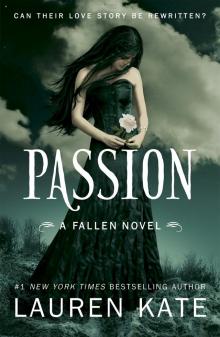 Passion
Passion Fallen
Fallen Torment
Torment Waterfall
Waterfall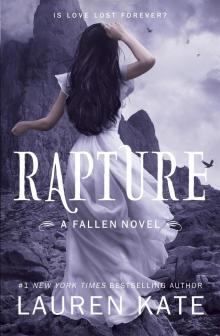 Rapture
Rapture Unforgiven
Unforgiven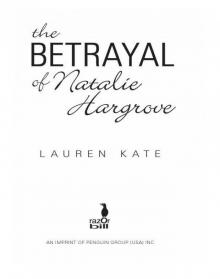 The Betrayal of Natalie Hargrove
The Betrayal of Natalie Hargrove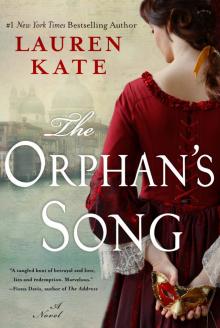 The Orphan's Song
The Orphan's Song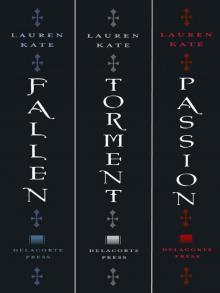 The Fallen Sequence: An Omnibus Edition
The Fallen Sequence: An Omnibus Edition Teardrop (Teardrop Trilogy 1)
Teardrop (Teardrop Trilogy 1) Fallen_Angels in the Dark
Fallen_Angels in the Dark